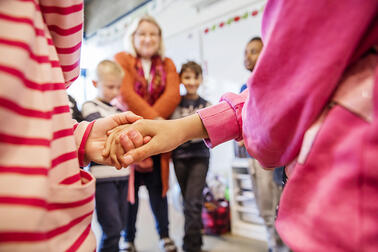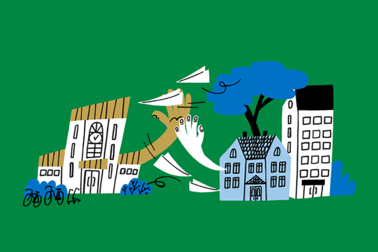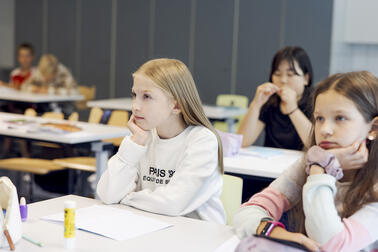
Results of the customer survey implemented every two years remain excellent
First grade, fifth grade and eighth grade pupils in City of Helsinki schools and their guardians assessed basic education in Helsinki. Nearly 8,000 pupils and 4,000 guardians responded to the survey.
“We would like to thank all the pupils and their guardians who responded to the survey,” comment Head of Finnish-language Basic Education Outi Salo and Substitute Head of Swedish-language Basic Education Agneta Eklund.
Overall satisfaction with the school and education among the guardians who responded to the survey remains at the same high level as in the previous survey two years ago. Pupil satisfaction decreased slightly from the previous survey. The overall satisfaction among guardians was 6.0 and pupils 5.5 on a scale of 1–7.
The greatest difference in the overall result is in the estimates given by girls in the third and eighth grades (6.07–4.61). Eighty-one per cent of first-graders agreed with the statements, whereas the same figure for eighth-graders was 59. The results for guardians were similar: guardians of first-graders agreed the most with the statements (5.96), whereas the guardians of eighth-graders agreed with the statements the least (5.66).
Guardian assessments of the pupils’ well-being, learning environment as well as cooperation between home and school remained the same
Guardians’ satisfaction with the start of school in first grade on a scale of 1–7 was 6.1, which remained nearly at the same level as in the previous survey, 6.2. The school grade on the quality of and satisfaction with after-school activities provided by the parents remains 8.5.
Guardians assessed the cooperation between the home and school by commenting whether the school communicates actively about school activities and whether teachers are easy to approach in matters concerning the child. Questions related to well-being concerned issues such as whether children are treated with respect at school, whether friendships are supported and whether bullying is intervened with.
“Positive appraisals of well-being, the learning environment and the cooperation between the home and school by the guardians demonstrate that schools have performed fruitful work to promote learning and pupil well-being. Thanks for this work is due especially to the teachers, who perform excellent work with the pupils each day,” Salo emphasises.
After-school activities received the best grade in the pupils’ responses, which also emphasised the significant role of friends
The overall result of the pupil survey was 5.4 on a scale of 1–7. The pupils’ assessment of their opportunity to participate was 4.7, studying and learning support received an assessment of 5.4, well-being an assessment of 5.7, premises and school environment an assessment of 5.5 and overall satisfaction an assessment of 5.5. After-school activities received the best assessment of the six areas, 6.0.
Participation, studying and learning support, well-being, premises and the school environment as well as overall satisfaction declined slightly from the previous survey, and the assessment of after-school activities remained the same as before.
The highest appraisals were given to the individual statements below
• I have friends at school (6.53)
• I have friends in after-school activities (6.32)
• I get support at school if I struggle with learning (6.03)
• I get help in doing my homework assignments when I need it (6.02)
The lowest appraisals were given to the following statements
• there are clubs at school that interest me (4.01)
• I can sometimes choose how to work during lessons (4.30)
• assessments help me learn (4.70)
• I usually enjoy going to school (4.92)
More than 8,000 responses to free word questions
Pupils assessed studying and learning support in terms of whether they receive help at school, if they struggle with learning, or whether they are praised and encouraged at school. Questions concerning well-being focused on friendships, interventions in bullying and whether there are adults at school that pupils feel they can talk to.
As far as premises and the school environment were concerned, the pupils commented on the feeling of safety at school and whether the class has lessons outside the school building.
Pupils also responded to the questions “what is particularly good at your school” and “how could your school be improved”. There were 4,059 open answers to the former and 3,932 to the latter. Pupils’ responses in all age groups mentioned friends as a great positive. First-graders hoped for more play and exercise in their school days, and older pupils hoped for more friendliness and fewer arguments.
Most guardians and pupils respond to the survey in Finnish
Guardians provided responses in six languages. The vast majority of responses to the guardians’ survey were given in Finnish (3,526), but responses were also provided in English (168), Swedish (185), Russian (48), Arabic (16) and Estonian (10). The most active responders were the guardians of first-graders.
Most pupils completed the survey in Finnish. We received 568 responses in Swedish and 267 in English.
The surveys given to first-graders contained ‘smiley faces’ to help with responses, and in addition to school, first-graders were also asked about after-school activities. Surveys given to pupils in grades 5 and 8 contained a total of 25 statements, two open-ended questions and one feedback question.
Schools to process their own results with principal and inform guardians
The customer survey is an important tool in developing basic education in Helsinki. The results will be reviewed in autumn 2024 together with both pupils at schools and guardians at parental evenings. The response rate of the customer survey increased to 26 per cent among guardians and decreased to 52 per cent among pupils, whereas the same figures in 2022 were 25 and 57.
“With the help of the customer satisfaction survey, we monitor the activities of schools and receive important feedback for development, both at the city level and separately for each school. The results of the survey provide valuable information to the school community for developing their own activities in cooperation with pupils and their guardians. Free word responses by pupils, in particular", contain praise and development ideas that should be reviewed together at the school,” says Eklund.


